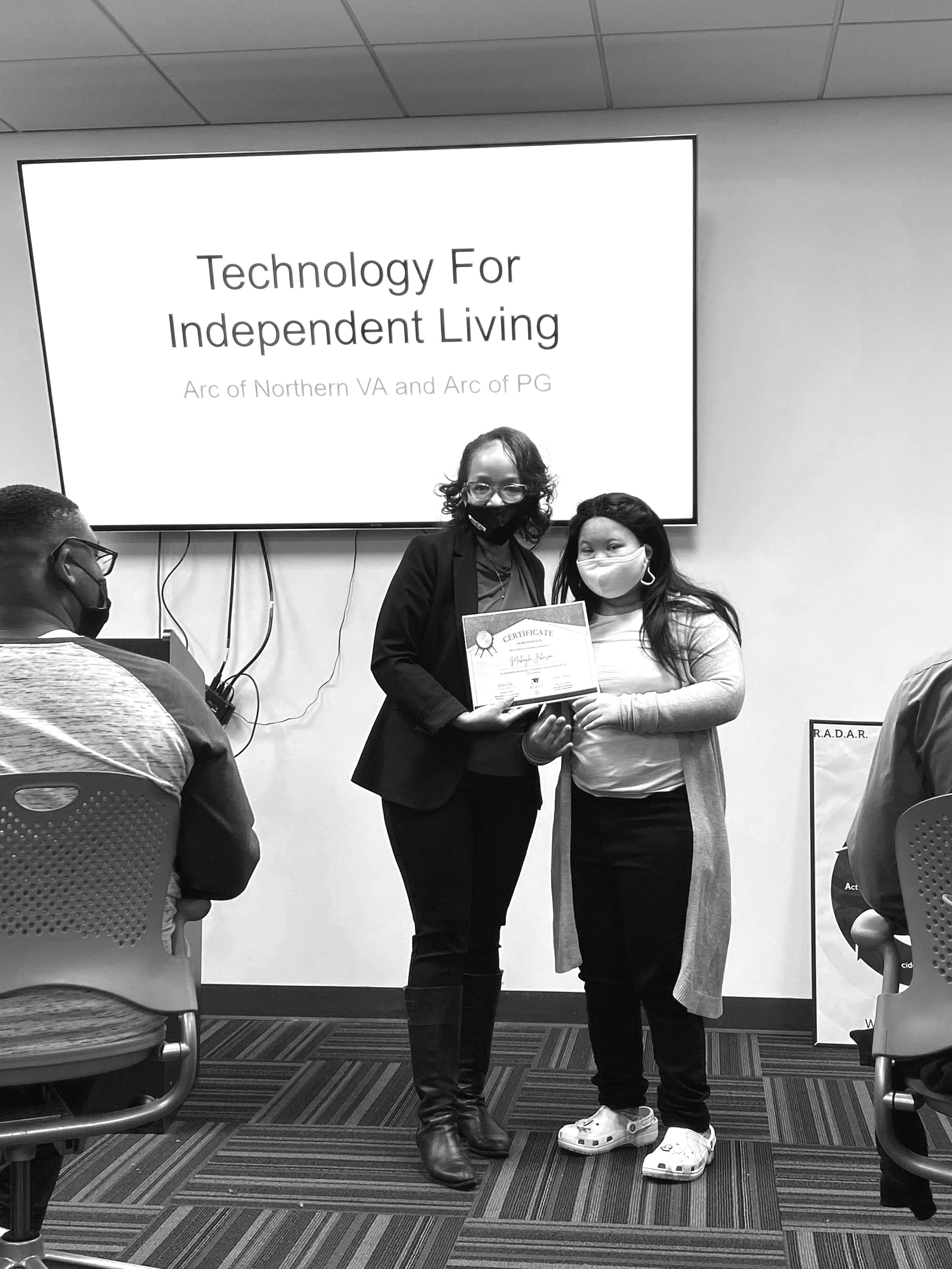The Arc of P.G. County Wants to Strengthen Its Bonds With Local Institutions
This article is part 2 of 4 articles on Covid-19 and the Black community. The Intersection Mag received a grant from The National Association of Black Journalists to report on Covid-19 and the Black community.
In March 2020, Melonee Clark had been keenly watching and reading the news about the spread of COVID-19. “ I am a news junkie,” said Clark, the outreach and resource manager for the Arc of Prince George’s County. She was convinced that more people were going to get infected. So she tried to inform her interns, who worked with her at The Arc of Prince George’s County, a non-profit organization that provides job readiness programs for teenagers with disabilities. Her interns, she told me, didn’t believe her. They had been reading social media and agreed with the misinformation that it was a hoax. Clark’s prophetic inclinations were right. As the virus increased its spread, the NBA decided to temporarily shut down basketball stadiums – temporarily putting the season on hold – until further notice.
That same month, Angela Alsobrooks, county executive, temporarily closed some government buildings. The Prince George’s County School system was one of them. After that temporary period - March 16-27, CEO Monica Goldson made a decision to extend PGCPS’s closures, transitioning all children and teachers to virtual learning. Because The Arc follows the Prince George’s County School System, unfortunately, it too temporarily halted its services to local families. Clark and her team contacted their clients, informing them they would cease their Wednesday and Saturday morning training for 35 teenagers with developmental disabilities. The classes help these children to prepare for a career after high school. “We had to send out a mass email, saying we were shutting down,” she explained.
Covid-19 disrupted The Arc's mission to serve parents and guardians with disabled children, causing its staff to rethink how it was going to serve them in the middle of a pandemic. Additionally, the coronavirus would help to exacerbate existing barriers among the disabled community in Prince George’s County.
The Arc is a national non-profit organization, founded in 1953. It was created to advocate for the rights and inclusion of humans with developmental disabilities. Washington, D.C. is where its national headquarters is located. The organization has chapters throughout the U.S., which the Arc of Prince George’s County is a part of. The local chapter provides a number of programs for toddlers, teenagers – teaching them skills that would help them to get employed – and adults. The organization also does advocacy work on a state and local level. Its advocacy includes making sure the state is upholding current laws surrounding humans with disabilities.
Shutting the doors of the organization wasn’t only about following the PGCPS’s schedule, but also about staving off coronavirus transmission, and death. Children and adults with developmental or intellectual disabilities, according to a New England Medical Journal study, “have the strongest independent risk factor for presenting with a Covid-19 diagnosis and the strongest independent risk factor other than age for Covid-19 mortality.”
Due to the closing, Clark and her team had to revamp and transition Wednesday and Saturday classes to virtual. It wasn’t until June, Clark said, that they were able to get a virtual up and running.
Virtual Learning And Disability
The organization had never used a virtual portal to teach its classes before. They were new to it. Furthermore, these particular students had never had to sit in front of a computer for a long duration of time to be educated. Both were entering uncharted territory.
Some students have sensory limitations, which possibly hindered their ability to stay online for long periods of time. Clark said, “There were two students that just couldn't handle sitting in front of [the computer screen].”
Additionally, this also caused problems for some parents. As you remember, in Prince George’s County federal buildings were shut down, as well as some other facilities.
Federal employees worked at home alongside their children while they were attending virtual school. Some parents were newcomers to Zoom and Google Classroom – and were confused about how these systems worked. “That was a big barrier,” Clark recalled. “People were contacting us and asking, ‘Do you have somebody to come to my house?’ I got to work. He needs to get on Zoom.’”
There were other challenges as well. Clark said some families had to wait until the PGCPS school system issued their children laptops.
In 2020, Dr. Renee Garraway and her youngest son had similar challenges with virtual learning. Garraway, a clinical social worker and therapist, has two boys. Years before the pandemic, both of her sons were diagnosed with disabilities. Her oldest son had delayed speech, while her youngest son was born with autism and down syndrome. Both were in the Infant Toddler Program, an early intervention program that helps children with disabilities flourish. “The Prince George’s County Infant and Toddler Program worked well for my children,” Garraway said.
Eventually, as Garraway told me, she chose to transition both of her sons out of the Infant and Toddler program to Prince George’s School System. They were both eligible. With teachers' help, her oldest son's speech progressed, and he no longer needed assistance. However, her youngest son would continue to need support during school hours. Her youngest – who is now 8 years old – was given a standard Individualized Education Program (IEP). His IEP outlined that her son needed help sitting up, speech, and occupational therapy. Garraway said his pre-K teachers did a fantastic job following his IEP. However, it was when he entered kindergarten that she started to notice that his IEP wasn’t being followed.
Unfortunately, as her son moved from kindergarten through first grade, Garraway said, due to a lack of teachers, and not following her son’s IEP, allegedly the school system did not provide adequate care for him. Through those years, Garrawy became her son’s biggest advocate. As her son was entering second grade, the pandemic arrived, disrupting a fragile education system. His school experience was made worse.
“The online process was very difficult for general and special educators,” said Garraway, who wanted me to know that she honors all educators. “This was our problem and our story,” she said. There were some bright spots. She said her son’s occupational and speech therapists did a wonderful job of online engagement. “I have to give them credit for that.”
“I think that some of the educators in Prince George’s County get a bad rap,” Garraway added. “I'm still pro-P.G. County. I'm still for special educators. But, I just think that they need more resources.”
There was this one specifica teacher that Garraway felt struggled to do her job during the pandemic. Sometimes, she said, when Garraway and her son would log on, the teacher would not be present on the screen, or late to appear on-screen. It was really discouraging for both of them. Her son was already facing some challenges with being online for long hours. In combination with these difficulties, her son missed some class time. Furthermore, she thought that some of the teacher’s curriculum was more than what he could comprehend. “The work wasn’t differentiated enough,” Garraway explained.
Differentiation is when instructors don’t replace IEP or 504 plans for students with disabilities. Instead, they stick tightly to the goals outlined in the IEP. Doing this is not only required but essential to the success of children with disabilities.
At the beginning of the 2021-22 school year, PGCPS welcomed all students back for in-person learning. Garraway opted for her child to continue virtual learning, even though it wasn’t going well. He was given virtual direct aid. Garraway said there were online breakout rooms and assessments given. However, according to Garraway, her son’s one-on-one special education teacher was in the classroom with other children and teachers while conducting his lesson. “I said to the teacher, ‘We can’t even hear you, because of the background noise,’” Garraway said she told the teacher through the computer screen.
Eventually, she did send him back for in-person instruction at the end of October 2021. She did so because teachers told her they could do a better job teaching and supporting him if he would return to in-person learning. “He still didn't get a speech assessment that he was supposed to,” she said.
Underwater
Garraway’s experiences can be further put into context by a 2021 Rand study, one co-authored by Laura Stelitano – research manager at The Center For Learner Equity. Stelitano and the rest of her team used survey data to compile this study. Stelitano, who conducts research on students with disabilities, said the study revealed how teachers (special education teachers, as well as general educators) “felt really unprepared to teach their kids.”
“A lot of the teachers said they just really didn’t even know if their kids were on the other end of the line or if they were accessing the instructions they provided,” said Stelitano, referencing the study.
The study looked at how secondary special education and general education teachers struggled to educate children with disabilities during the 2020-21 school year. It also looked at how teachers were able to adequately prepare disabled children for college and job readiness. Something that Clark, who trains teenagers with disabilities for job readiness at The Arc, is deeply concerned and passionate about. Though the study was centered on secondary special and general education, it does speak to national trends of how COVID-19 disrupted the profession of education and the kids' access to better education.
Stelitano said it was difficult for teachers during that time of the pandemic to switch their instructional models to virtual. According to the study, some collaborations between general and special educators and consultants, who advise teachers, were also difficult. General educators – who also participated in instructing children with disabilities – felt unsupported. Special educators felt burdened with the singular responsibility of talking to parents about their children. And, more specifically, special educators did not feel they had adequate support for communicating with their students virtually.
It Takes A Community
Clark and Garraway – albeit from different positions – believe that better kinds of collaboration with schools, faith-based and government organizations must emerge so that children with disabilities can continue to flourish.
Garraway believes the school system should work with parents to help to fill in information gaps. The school should provide more opportunities for parents to understand the education process and know how to navigate it for children with disabilities. Additionally, she said, the school system should be more transparent about services, and better provide clarity on IEP goals.
There is one more problem. Garraway believes the Prince George’s County School system should better implement systems that would allow teachers to gain more professional development and support. By this, Garraway means perhaps teachers could coordinate with outside providers to help implement some strategies that could make the learning experiences better for children with disabilities.
The pandemic produced an educational gap in preparing The Arc’s teenagers with disabilities for life outside the school system. Partnering with local institutions, Clark believes, could help to fortify support for children and families during this ongoing pandemic. “Some of these supports could be layered,” explained Clark. “We were just talking to a county agency. We do some of the same things, in regard to work readiness programs. They do it too. We are going to layer it up.”
Now our connections are like “a box,” she said, “but we are going to make a nice little circle, where we are evolving and flowing.”
The pandemic’s impact on teachers’ health, teachers leaving the profession and students' school attendance have all impacted the school system. “We just have to be intentional so that we can pivot and so that nothing ever stops,” she said. “Our students will suffer greatly if we are not intentional about how we support their learning.”
The Arc won a grant from the TD Foundation. This past summer, the organization used that grant to start an in-person youth tutoring program that teaches academic and functional skills. Realizing that high school graduates may also need educational support, the Arc allowed them to attend tutoring classes for ongoing instruction. The program allows them to teach students and former students about skills they need for life, as well as how to gain employment.
Clark said they also created a virtual coaching program for youth. The online program creates goals for them. A coach will provide advice that will help them to meet their life goals to enhance their skill set. Their coach, Clark said, would check back in to see how they're progressive.
Clark said since everybody was on lockdown, they needed to gather everyone back together. So back in June, they held an outside event, to which they invited all their clients. The event was centered around family and health. Local specialists gave presentations on health, and they danced, and enjoyed one another together, according to Clark. Seeing her students for the first time outside of Zoom calls allowed her to see how much they had grown.
“They were happy to interact, and see people,” explained Clark. “ You could just see that that was what they needed.”
Check Out Other Coverage On Covid-19 In Prince George’s County







As parents and community members, we stand with our immigrant families. Schools, churches, and other trusted places should be safe for everyone, not places of fear. While we work to understand what this change means, we want to be clear: our neighbors deserve to feel safe and supported.